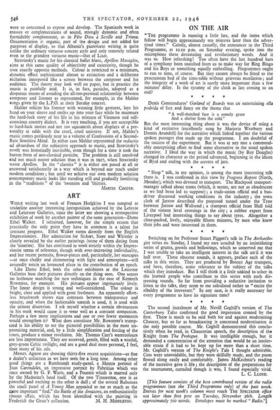ON THE AIR
"THE programme is running a little late, and the items which follow will begin approximately ten minutes later than the adver- tised times." Calmly, almost casually, the announcer in the Third Programme, at rod° p.m. on Saturday evening, spoke into the microphone these devastating and revolutionary words. And it was so. How refreshing! Too often have the last hundred bars of a symphony been snatched from us to make way for Bing Bingo and his Boys or something equally enthralling. Programmes ought to run to time, of course. But they cannot always be fitted to the procrustean bed of the time-table without grievous mutilation ; and the integrity of a work of art is surely more important than a few minutes' delay. Is the tyranny of the clock at last coming to an end?
Denis Constanduros' Garland of Beards was an entertaining olla podrida of fact and fancy on the theme that " A well-thatched face is a comely grace And a shelter from the cold."
But the most interesting thing about it was the device of using a kind of recitative (excellently sung by Marjorie Westbury and Dennis Arundell) for the narrative which linked together the various spoken passages that made up the programme. I am doubtful of the success of the experiment. But it was at any rate a commend- ably enterprising effort to find some alternative to the usual spoken narrative. I liked the way in which the music (by Roy Douglas) changed its character as the period advanced, beginning in the idiom of Byrd and ending with the accents of jazz.
* * * * " Shop" talk, in my opinion, is among the most interesting talk there is. I was confirmed in this view by Progress Report (North, Monday), which was devoted to transport. The Blackpool transport- manager talked about trams (which, it seems, are not as obsolescent as we had been led to suppose); a trade-union official and a bus- driver discussed working conditions in the industry ; the town clerk of Jarrow described the proposed tunnel under the Tyne between Jarrow and Wallsend ; a transport official from Hull told of the sixteen level crossings in the city ; a rubber expert from Liverpool had interesting things to say about tyres. Altogether a close-packed, lively, enjoyable fifteen minutes, by men who knew their jobs and were interested in them.
* * * * Switching on for Professor Stuart Piggott's talk in The Archeolo- gist series on Sunday, I found my ears assailed by an intimidating series of grunts, growls and bellowings, which so unnerved me that I was unable to take an intelligent interest in the talk until it was half over. These obscene sounds, it appears, preface each of the talks in this series. They are produced by Bronze Age trumpets, and have, therefore, some relevance to the subject of the talks which they introduce. But I still think it a little unkind to usher in the learned people who contribute to this series with such dis- tressing sounds. So far from providing a seductive invitation to listen to the talks, they seem to me calculated rather to " excite the ribaldry of the irreverent." In any case, is it really necessary for every programme to have its signature tune?
* * * * The second instalment of Mr. Nevin Coghill's version of The Canterbury Tales confirmed the good impression created by the first. There is much to be said both for and against modernising Chaucer, but so far as broadcasting is concerned modernisation is the only possible course. Mr. Coghill demonstrated this conclu- sively when he read, in Chaucerian speech, the description of the Knight from The Prologue. It was intelligible enough, but it demanded a concentration of the attention that would be an intoler- able strain if it had to be kept up for more than a short time. Mr. Coghill's version of The Knight's Tale I thought admirable. Cuts were unavoidable, but they were skilfully made, and the poem flowed along easily and comfortably. James McKechnie's reading of the narrative gave it life - the description of the preparations for the tournament, curtailed though it was, I found especially vivid.
L. C. LLOYD.
[This feature consists of the best contributed review of the radio programmes (not the Third Programme only) of the past week. Entries for next week's column must reach THE SPECTATOR office not later than first post on Tuesday, November 26th. Length approximately No words. Envelopes must be marked " Radio."1


































 Previous page
Previous page